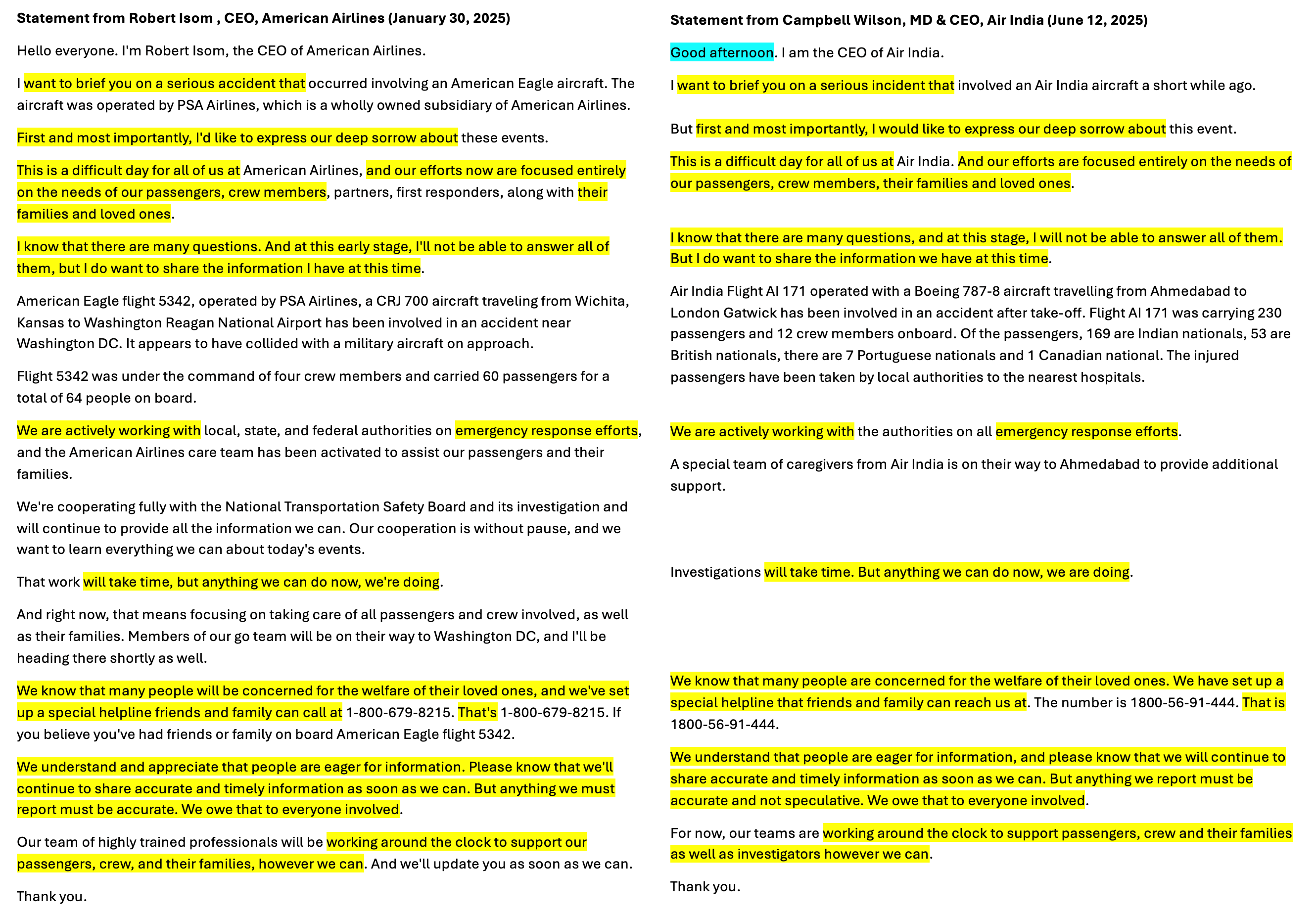



Crisis comms or copy-paste? Air India draws scrutiny for CEO’s mirrored statement
share on
Air India is facing scrutiny after CEO Campbell Wilson issued a crisis video statement that bore striking resemblance to one delivered earlier this year by American Airlines CEO Robert Isom.
The resemblance wasn’t subtle. From cadence to content, the two statements followed an almost identical structure, apart from Wilson’s perfunctory “good afternoon.” Some social media users also wondered if the two CEOs had used AI to craft the message, leading to the same statement being used during crisis.
While some initially praised the statement for hitting the right tone, the similarity in phrasing, structure and delivery in a time of crisis has prompted renewed questions about how brands handle communications in high-stakes moments especially since templated responses, no matter how well delivered, can do more harm than good.
Don't miss: Why Jetstar Asia’s closure announcement failed to land with consumers
In conversation with MARKETING-INTERACTIVE, Jonathan Tan, founder and managing director of VoxEureka, called the similarities "glaring — from word choice to pacing and structure."
“In the wake of any tragedy, there are generally core ingredients we expect from a brand or spokesperson — empathy, transparency, accountability. So, some overlap in tone and structure isn’t surprising. But in this case, it’s enough to make anyone do a double take, especially in a time where we’re hyper-aware of AI capabilities and deepfakes," said Tan.
Tan acknowledged that communications teams often rely on pre-drafted scripts during crises for clarity and legal adherence. However, he stressed the statement should still sound human and not soulless:
If it reads like a templated response — or worse, like it’s been lifted — it does more harm than good. The risk isn’t just plagiarism accusations; it’s erosion of public trust.
Echoing Tan, Edwin Yeo, general manager at SPRG, said the mirrored statements were "definitely surprising." Yeo speculated AI might have played a role and while he believes there is nothing wrong with using AI, the communications team still need to check if the speech was used before, or if it’s too similar to other speeches made.
He added that the points made were probably what Wilson “should be saying anyway” but that the delivery lacked authenticity.

Presence, over polish
Meilin Wong, CEO and partner at Milk & Honey PR SEA, called the similarities “deeply disappointing and very concerning.”
“Not because statements can’t sound similar in such moments, but because this was near-verbatim with no attempt to contextualise or personalise,” she said, explaining that when a CEO speaks after a tragedy, every word, non-word, and tonality carry weight. Borrowing language without adaptation misses the opportunity to lead with empathy and risks sounding generic when what’s needed is a sense of real presence and responsibility.
Wong emphasised that the most impactful statements aren't always polished but are unmistakably their own. “It’s normal for companies to have crisis communication frameworks. In fact, it’s essential and responsible. There’s a big difference between being prepared and being impersonal. Every crisis, especially those involving fatalities, must be treated with the nuance, empathy, and gravity it deserves,” she said.
“A well-prepared CEO should be supported with context-specific messaging that reflects their voice, the company’s values, and the unique facts of the situation. I often recommend preparing principles, not paragraphs. Frameworks that help a CEO respond with clarity, accountability, and care. Anything less feels hollow," added Wong, saying:
This was a moment that called for presence, not polish. A few lines acknowledging responsibility, compassion, and what comes next in their own words would have served them far better than echoing someone else’s.
What Air India could've done better
According to Ann Chong, managing director at TEAM LEWIS Malaysia, relying too heavily on templated or copied statements impacts the public's perception towards the company's culture and credibility. “While it is acceptable for companies to have elements of their statement similar, it is a better practice to ensure that statements are not a direct copy-and-paste,” said Chong.
Chong pointed to the International Air Transport Association (IATA) guidelines on crisis communications, which stress transparency and regular review of crisis manuals and holding statements. “Proactive reviewing would help ensure that they need not rush to create statements when bad things happen,” she added.
She also urged that advanced scenario planning and regular crisis simulations be standard practice where future events cannot be predicted, possible permutations, scenarios and outcomes can be discussed to ensure spokespersons are better prepared most of the time.
Tan closed with a broader reflection on authenticity in today’s climate. “Regardless of who came first, both CEOs came across overly scripted and emotionally detached. In moments like these, people are looking for authentic, accountable leadership, not just the ‘right’ words,” he said.
“A more personal and genuine delivery, even with a prepared script, would have gone a long way to build a connection with audiences. This is also a reminder that media training shouldn’t just focus on avoiding mistakes but rather help spokespeople speak with their own voice, not as polished performers," said Tan.
As Wong concluded:
Plagiarising another CEO’s words, even if unintentional, shows a lack of readiness and judgment. This is why companies, especially those in highly scrutinised, high-risk industries, must invest in being truly crisis-ready.
Related articles:
Jetstar Asia's shutdown: Does marketing even matter with price conscious customers?
Technical issues, safety concerns and alleged staff poaching: How Malaysia Airlines can fight the PR turbulence
'We need to talk': Penang mural artist calls out AirAsia over use of his work
share on
Free newsletter
Get the daily lowdown on Asia's top marketing stories.
We break down the big and messy topics of the day so you're updated on the most important developments in Asia's marketing development – for free.
subscribe now open in new window
